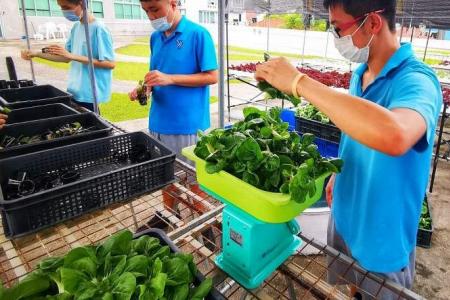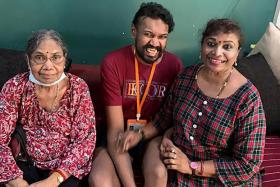More help for those on autism spectrum after age 18
To better support young people on the autism spectrum, a new day activity programme by the Autism Association (Singapore) will make use of community spaces such as public libraries and schools.
The use of community spaces aims to address the issue of the lack of capacity in day activity centres (DACs) for those over 18, which is the age when they graduate from special education (Sped) schools.
Currently, the waiting time for a DAC place ranges from one month to five years. This may be because of the low exit rate from DACs, as almost all participants leave on a voluntary basis, said Mr Stanley Chan, director of special projects at Autism Association (Singapore), elaborating on the new programme called DAC Without Walls.
It is one of several programmes under the Autism Network Singapore (ANS), of which Autism Association (Singapore) is a partner, which were revealed to mark World Autism Awareness Day on April 2.
The programme, which was piloted in July 2022, has engaged more than 66 beneficiaries in activities such as baking, fishing and reading in community spaces like schools and public libraries.
The association hopes to launch the full programme by the second half of 2023, Mr Chan added.
Although no formal study on the prevalence of autism has been conducted in Singapore, estimates based on data from public hospitals suggest that numbers are increasing here.
More than 5,500 children aged six and below were diagnosed with developmental problems in 2018, up from an average of 4,362 new cases each year from 2015 to 2017.
As at 2016, it was estimated that one in 150 children in Singapore was on the autism spectrum, a higher rate than the global figure of one in 160.
There has been a growing gap between supply and demand for services for the post-18 group, with the number of Sped school graduates increasing at an average of 5 per cent a year in the last three years.
President of Autism Resource Centre (Singapore) and chairman of Autism Association (Singapore) Denise Phua said: “The cliff effect after formal schooling is well known, but there continues to be a dearth of services for adults across the autism spectrum.”
Mr Chan said: “If we can bring (those with autism) into community spaces, it will also improve awareness among the public because that may be the first time some of them engage with somebody who has autism.
“The more you engage with them, the easier it is to accept.”
Adults on the autism spectrum who may not be suited to open employment – where people with and without disabilities work together in similar roles – can also tap a new pilot programme by St Andrew’s Autism Centre for supported employment, where they can receive more support for work tasks and personal care.
The centre’s Dignity of Work programme helps its clients contribute to society by working with corporates in sectors such as urban farming, laundry and packing.
Statistics provided by ANS found that among residents with disabilities between the ages of 15 and 64, an average of 31.4 per cent were employed in 2021 and 2022.
Three per cent were unemployed and looking for a job, while 65.7 per cent were outside the labour force, citing poor health and disability as the main reasons.

Chief executive of St Andrew’s Autism Centre Bernard Chew said: “For many of them, given their degree of autism and cognitive impairments, it is challenging for them to access open employment or live independently, but they still deserve to live with dignity.”
Rainbow Centre, one of the ANS’ partners, has also piloted a two-year Micro-Business Academy programme. Under the programme, young adults with higher support needs and their caregivers receive coaching to enable them to run small-scale businesses such as making handicrafts and snack gift boxes. A total of 41 clients have participated since 2020.
As part of World Autism Awareness Day this year, the ANS also launched a campaign themed “Time to Act”, which calls for mainstream institutions such as schools and employers to be more proactive in supporting individuals with autism.
The campaign will hold open houses and free tours of organisations that work with those on the autism spectrum, like Rainbow Centre and St Andrew’s Autism Centre, from April 13 to 25. More information can be found at bit.ly/ansopenhouses
Get The New Paper on your phone with the free TNP app. Download from the Apple App Store or Google Play Store now



